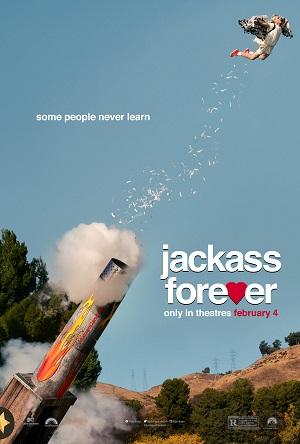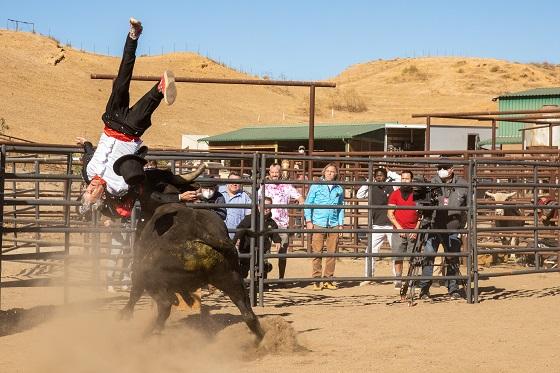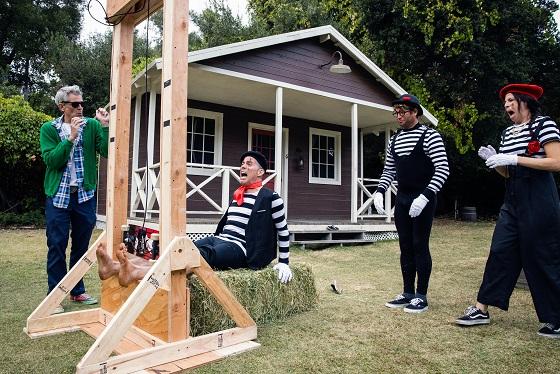

[Rating: Solid Rock Fist Up]
Only in theaters Friday, February 4.
When “Jackass” premiered as a television show on MTV, America was cruising. The economy in October 2000 was banging, U.S. troops weren’t stuck in any forever-wars, and technological innovations seemed to bring new and exciting gadgets to the masses every day. Artistic groundswells defined each preceding decade, from the counterculture of the 60s, to New Hollywood/punk in the 70s, metal and glam in the 80s, and indie film/hip-hop in the 90s; so as the new millennium dawned and all the conflict, despair, poverty, and oppression seemed to vanish from America’s shores, a curious world looked ahead to the cultural landmarks that would define the new decade.
And as it would happen, quite to everyone’s surprise, what seemed to capture the social and cultural zeitgeist better than anything else was a collection of gleeful idiots punching each other in the dick. In a decade when pre-packaged boy bands, reality television, and conglomerate filmmaking stood in for culture, about the closest thing to “genuine” and true to the moment was introduced each week with the equally earnest, straightforward, and honest greeting, “Hello, I’m Johnny Knoxville: welcome to Jackass.”
Working at first as a reflection of what we’d become as a society (people with so much money and free time that we had to beat the shit out of each other to experience something), Jackass conveniently shifted into the distraction the United States needed when it substituted earnest reflection and diplomacy with warmongering. Where once they had acted as avatars of American exceptionalism, resiliency, and stupidity in the face of a bigger, less-insulated world, Knoxville, Chris Pontius, Steve-O, and the rest of the gang became sin-eaters for a nation that didn’t (and still hasn’t managed to) figure out a way to atone for its broader sins.
Perhaps that is why the release of this week’s Jackass Forever, the 4th film installment of the franchise, feels so essential right now: because while many things have changed, America’s need to atone for its fuckery has not. Knoxville et al have returned to their essential positions as court jesters, as mascots for a society that is still just as vapid, spiritually bankrupt, and nihilistic as ever. And goddammit, it’s magnificent.

The troupe plays all the hits, as it were, sacrificing their bodies for cheap humor that doubles for therapy, and for most people, that will be enough. A crude Godzilla and cum-themed comedy skit kicks things off, as if to ensure audiences that 20+ years of aging hasn’t necessarily brought maturity with it. A series of self-inflicted pain stunts follow, mixing straight physical comedy (testicle torture for Ehren McGhehey) with skate video stunts and pseudo-improvisations, harkening back to the comedy format’s earliest days.
And lest fans of the franchise worry: all the regulars have returned for this fourth entry in the needless pain sweepstakes, save the late-great Ryan Dunn and Bam Margera. Several of the Jackass Forever veterans remark throughout the movie that age is catching up to them, which seems to have played an unspoken part in the addition of several new (younger) castmates, including Jasper Dolphin, Rachel Wolfson, Zach Holmes, and Sean ‘Poopies’ McInerney. All of them earn their stripes and then some in a series of stunts that include scorpions, tarantulas, rattlesnakes, skateboard guillotines, and more, never leaving the audience much time to catch their breath before assaulting them once again with the deliciously ridiculous.
Indeed, about the only thing that didn’t hit with the same impact as the rest of the material were the vignettes featuring the Jackass team out into public and pranking unsuspecting bystanders (which were funny enough, but don’t seem quite as special as they once might have). Which is interesting in and of itself. The pranks Knoxville and the rest of the gang play on each other still hit with all the hilarious intensity of anything they pulled off over the last two decades, yet there seems to be less runway for anything involving civilians in the real world. Maybe it’s the proliferation of cell phone cameras and viral videos, or perhaps it’s just because people feel like the last two years have brought enough surprises, but there’s something missing in these moments.

But that’s okay, perhaps because they make up such a small portion of Jackass Forever (as if director Jeff Tremaine and the others realized the diminishing returns for these scenes). Alternatively, there’s a refreshing, almost primal connection between the audience and Steve-O when he takes a volleyball to the face at 50+ mph, one made wholesome by Knoxville’s eager embrace of his friend after launching the projectile at him. Like forebears such as Houdini or Evel Knievel, these people are getting hurt for us, and they seem to be having a blast doing it: how can anyone fail to be gripped by that?
And that’s fascinating. The fact that America needs Jackass just as much now as it did in October 2000 demands a deeper examination of the national character and the idea of human resiliency than what this meager review can offer. Back in the late-90s, when Bam Margera and the CKY crew were unknowingly laying the foundation for what Jackass would become with their skate videos, there was a whole generation of white, middle-class kids struggling to find an avenue for their angst in an era without villains, social strife, poverty, or war. To fill that void, Margera and co. (and many more like them) rode shopping carts into hedges, took 70 mph shits out the window of panel vans, and trashed rental cars for no other sin than the fact that they had no tape deck, “just an AM/FM radio.”
Somehow that’s still timely, side-splittingly funny, and absolutely, 100% essential. And while some of the stunts are recycled versions of earlier work (something the cast remarks on with no apparent concern), damn near every vignette works, giving it the same overall batting average in that regard as its three predecessors. Dolphin, Wolfson, Holmes, and Poopies make for great new blood amongst the cast, and the old guard remains as fearless (insane?) as ever. Although its hard to imagine Jackass literally going on “Forever,” this fourth installment proves that any attempt to do so should at least remain entertaining, and weirdly indispensable.





Comments on this entry are closed.